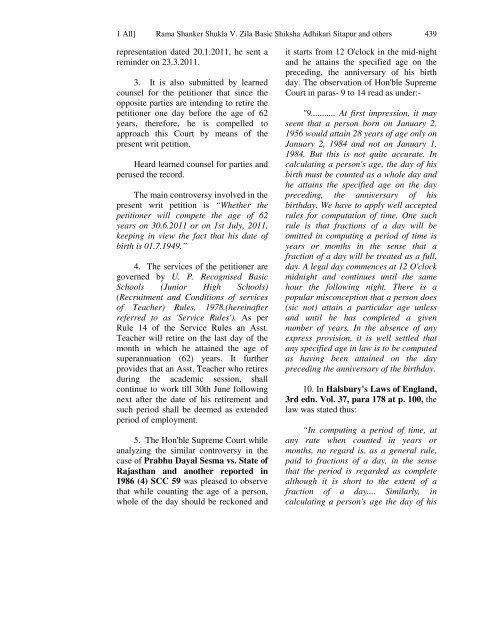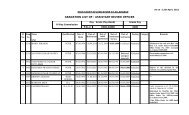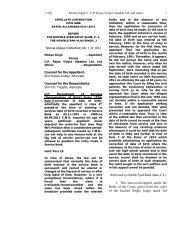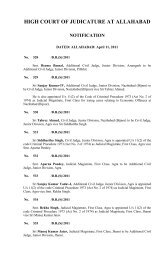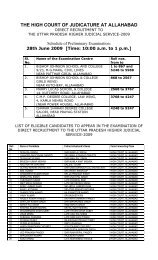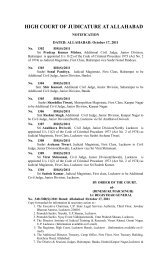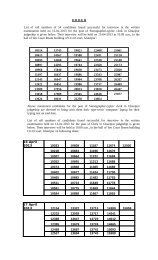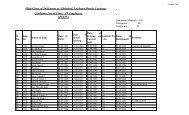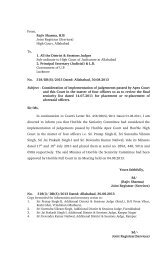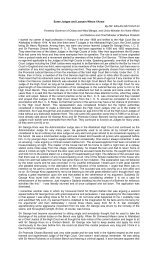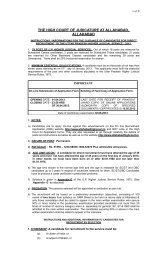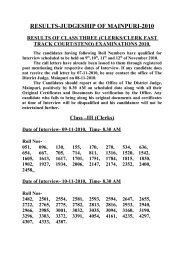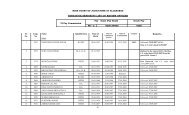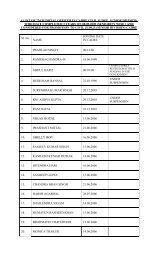Apr - High Court of Judicature at Allahabad
Apr - High Court of Judicature at Allahabad
Apr - High Court of Judicature at Allahabad
You also want an ePaper? Increase the reach of your titles
YUMPU automatically turns print PDFs into web optimized ePapers that Google loves.
1 All] Rama Shanker Shukla V. Zila Basic Shiksha Adhikari Sitapur and others 439<br />
represent<strong>at</strong>ion d<strong>at</strong>ed 20.1.2011, he sent a<br />
reminder on 23.3.2011.<br />
3. It is also submitted by learned<br />
counsel for the petitioner th<strong>at</strong> since the<br />
opposite parties are intending to retire the<br />
petitioner one day before the age <strong>of</strong> 62<br />
years, therefore, he is compelled to<br />
approach this <strong>Court</strong> by means <strong>of</strong> the<br />
present writ petition.<br />
Heard learned counsel for parties and<br />
perused the record.<br />
The main controversy involved in the<br />
present writ petition is “Whether the<br />
petitioner will compete the age <strong>of</strong> 62<br />
years on 30.6.2011 or on 1st July, 2011,<br />
keeping in view the fact th<strong>at</strong> his d<strong>at</strong>e <strong>of</strong><br />
birth is 01.7.1949.”<br />
4. The services <strong>of</strong> the petitioner are<br />
governed by U. P. Recognised Basic<br />
Schools (Junior <strong>High</strong> Schools)<br />
(Recruitment and Conditions <strong>of</strong> services<br />
<strong>of</strong> Teacher) Rules, 1978.(hereinafter<br />
referred to as 'Service Rules'). As per<br />
Rule 14 <strong>of</strong> the Service Rules an Asst.<br />
Teacher will retire on the last day <strong>of</strong> the<br />
month in which he <strong>at</strong>tained the age <strong>of</strong><br />
superannu<strong>at</strong>ion (62) years. It further<br />
provides th<strong>at</strong> an Asst. Teacher who retires<br />
during the academic session, shall<br />
continue to work till 30th June following<br />
next after the d<strong>at</strong>e <strong>of</strong> his retirement and<br />
such period shall be deemed as extended<br />
period <strong>of</strong> employment.<br />
5. The Hon'ble Supreme <strong>Court</strong> while<br />
analyzing the similar controversy in the<br />
case <strong>of</strong> Prabhu Dayal Sesma vs. St<strong>at</strong>e <strong>of</strong><br />
Rajasthan and another reported in<br />
1986 (4) SCC 59 was pleased to observe<br />
th<strong>at</strong> while counting the age <strong>of</strong> a person,<br />
whole <strong>of</strong> the day should be reckoned and<br />
it starts from 12 O'clock in the mid-night<br />
and he <strong>at</strong>tains the specified age on the<br />
preceding, the anniversary <strong>of</strong> his birth<br />
day. The observ<strong>at</strong>ion <strong>of</strong> Hon'ble Supreme<br />
<strong>Court</strong> in paras- 9 to 14 read as under:-<br />
"9........... At first impression, it may<br />
seem th<strong>at</strong> a person born on January 2,<br />
1956 would <strong>at</strong>tain 28 years <strong>of</strong> age only on<br />
January 2, 1984 and not on January 1,<br />
1984. But this is not quite accur<strong>at</strong>e. In<br />
calcul<strong>at</strong>ing a person's age, the day <strong>of</strong> his<br />
birth must be counted as a whole day and<br />
he <strong>at</strong>tains the specified age on the day<br />
preceding, the anniversary <strong>of</strong> his<br />
birthday. We have to apply well accepted<br />
rules for comput<strong>at</strong>ion <strong>of</strong> time. One such<br />
rule is th<strong>at</strong> fractions <strong>of</strong> a day will be<br />
omitted in computing a period <strong>of</strong> time is<br />
years or months in the sense th<strong>at</strong> a<br />
fraction <strong>of</strong> a day will be tre<strong>at</strong>ed as a full,<br />
day. A legal day commences <strong>at</strong> 12 O'clock<br />
midnight and continues until the same<br />
hour the following night. There is a<br />
popular misconception th<strong>at</strong> a person does<br />
(sic not) <strong>at</strong>tain a particular age unless<br />
and until he has completed a given<br />
number <strong>of</strong> years. In the absence <strong>of</strong> any<br />
express provision, it is well settled th<strong>at</strong><br />
any specified age in law is to be computed<br />
as having been <strong>at</strong>tained on the day<br />
preceding the anniversary <strong>of</strong> the birthday.<br />
10. In Halsbury's Laws <strong>of</strong> England,<br />
3rd edn. Vol. 37, para 178 <strong>at</strong> p. 100, the<br />
law was st<strong>at</strong>ed thus:<br />
“In computing a period <strong>of</strong> time, <strong>at</strong><br />
any r<strong>at</strong>e when counted in years or<br />
months, no regard is, as a general rule,<br />
paid to fractions <strong>of</strong> a day, in the sense<br />
th<strong>at</strong> the period is regarded as complete<br />
although it is short to the extent <strong>of</strong> a<br />
fraction <strong>of</strong> a day.... Similarly, in<br />
calcul<strong>at</strong>ing a person's age the day <strong>of</strong> his


